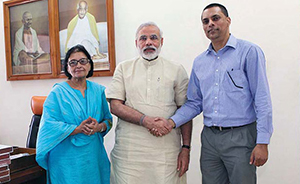Mental Disorders can be ‘Nipped in the Bud’: Intervening early for best results
To make early intervention more likely, there are two pre-conditions. The first is the full integration of psychiatry in healthcare. Psychiatry has a central place in healthcare. The education and support for all doctors including those in primary care to provide basic care is a key responsibility of medical schools. Unfortunately there are places where this is not the case and it is the quality of help and care for our young people in particular that then suffer. They and their families face unnecessary disruption at critical periods in education and social and family life. Too many young people are unable to fulfill their educational potential or to get married, or even die from suicide, for entirely preventable reasons.
The second pre-condition is a clear approach to health professionals working in partnership with the community and with each other. People with lived experience and their carers face stigma and discrimination in the community, and poor access to dignified care for mental and physical health problems. Achieving adequate support for mental health requires a unified approach. It requires the inclusion of people with lived experience and their carers in decisions about treatment and rehabilitation, service development, research and policy.
The dedicated work of non-government organisations in rural and urban areas of several countries including India is illustrative. It shows that early intervention along with community-based rehabilitation is feasible, at low cost, even where mental health resources are scarce. Community-based workers, trained and supervised by the few mental health professionals, including at least one or two psychiatrists, interact with families and community groups to identify those with onset of illness and support those receiving treatment and rehabilitation. Careful organization, referral and management are required, and the work in these systems needs evaluation. An important task for advocates of early intervention and advocates for the improvement of mental health more generally is placing the support for mental health research on the agenda of the major national and international development agencies, financial institutions and foundations.
The temptation for governments and non-government organisations in many countries is to concentrate the resources available for mental health care and research on those people with established illnesses and their neglected needs for treatment and rehabilitation. The barriers to early intervention include unwarranted pessimism about the effectiveness of treatments, scant resources dedicated to mental health, and lack of a unified approach among the relevant partners. Experience from the rest of medicine and the evidence for effective early intervention in psychiatry, however, point to the value of early intervention even when resources are meagre. Health promotion and prevention of other types are also warranted but the subject for another discussion.
Good solutions in a community, well described and evaluated, can lead on to feasible and innovative service developments that prevent disability and support family and community life. These developments are underpinned by strong links between health professionals, community leaders and people with lived experience of illness and their families, based on negotiation and mutual respect.











Comments.